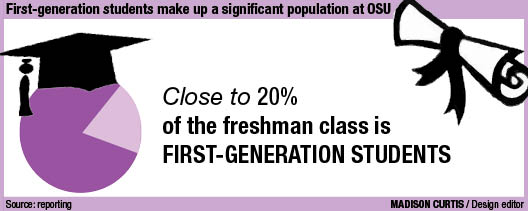Casey Ward hasn’t necessarily had an easy time on her path to a college degree.
The third-year, who is studying psychology and women’s gender and sexuality studies, is a first-generation college student and Appalachian, and said financial aid in particular has been a “nightmare” for her.
“College has always been my No. 1 goal,” Ward said. “I’ve never wanted to end up like my mother, working a mediocre job that pays just enough to support our family.”
She said she did not get much help in high school from her teachers and advisers, and had to make her college decisions and discoveries on her own.
“When I told my advisers I was applying to OSU, they told me that even as the class valedictorian, president and yearbook editor I would not get in, and even if I did, I wouldn’t be able to pay for it,” Ward said.
First-generation students make up a significant population at Ohio State, with close to 20 percent of the freshman class coming in as first-generation students, said Laura Kraus, associate director for Economic Access at OSU and adviser of College Mentors for Kids.
Economic Access works to help low income and first-generation students find a path to higher education.
“We (at Economic Access) do a pre-enrollment conference on campus called the Buckeye Leadership Connection that targets first-generation students,” Kraus said in an email.
The Buckeye Leadership Connection offers advice on networking, academic, personal, social and professional development skills, according to the First-Year Experience website. There are discussions held about living on campus, getting involved and what it means to be a first-generation student.
Kraus said the number of students who participate varies from year to year.
Kraus said first-generation students make up a diverse group that comes from multiple backgrounds with various identities. She said it is important that all first-generation students have a mentor to guide them.
“First-generation students may not have the knowledge of university structure and language, and that can be alienating,” Kraus said. “We need to work on our campus to ensure that we explain things carefully to all students and to understand that not everyone comes in with the same college knowledge.”
Despite that help, Ward said she’s still faced some struggles.
“My mom doesn’t have the answers for my questions so I have to rely on the financial aid services at OSU, which leaves something to be desired,” she said.
Autumn Wilson, a fourth-year in social work, has faced experiences similar to Ward’s. She said it was difficult figuring out the application process and finding scholarships, but comes from a family that values hard work, as her father owns his own business and her mother was in the Army.
“I, luckily, had friends going through the same process, so I wasn’t too lost,” Wilson said.
She said she never thought twice about going to college and it was always part of her plan, so she started working toward it at a fairly young age.
“In order to help me with the college process I started working when I was 15 and have held one or more jobs at a time ever since,” Wilson said.
Wilson said so far she has made the most of her time at OSU.
“I definitely feel that I appreciate college with a whole new light after working very hard to get here and to be successful throughout,” Wilson said. “I truly appreciate every opportunity I am given.”
Ward agreed.
“Ohio State felt like home to me,” Ward said. “It felt like the generic college experience I’ve always wanted, but it turned out to be so much more than face value.”



